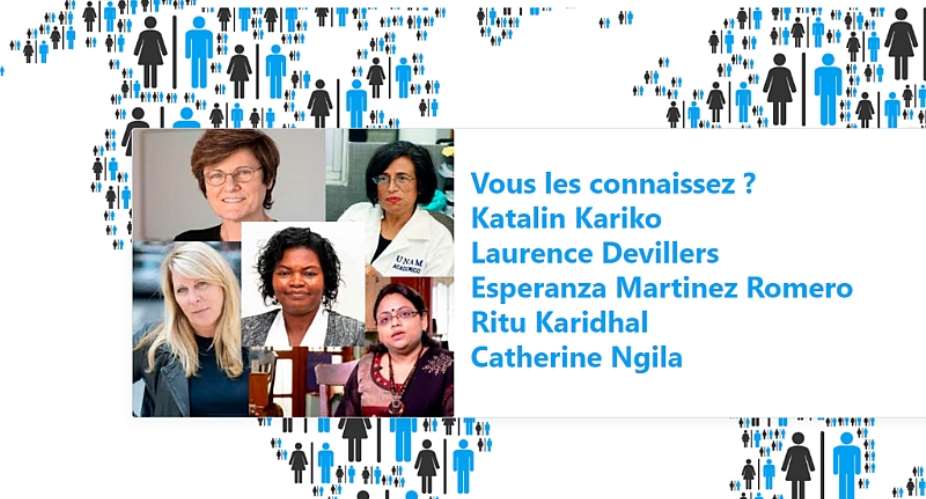Gender diversity in technology and science will be a key post-Covid advantage in developing and building damaged economies and societies, according to Gender Scan.
The Gender Scan research is an international study - in partnership with UNESCO and international associations – that examines the role of women in scientific and technology professions Among its goals is to raise the profile of women working in cutting-edge technology and science research sectors.
Women at the cutting edge
Have you ever heard of Katalin Kariko, Laurence Devillers, Esperanza Martinez Romero, Ritu Karidhal or Catherine Ngila? The chances are you have not.
However, coming from five different continents, these women are at the heart of some key innovations in the areas of science and technology including:
- Katalyn Kariko, the inventor of messenger RNA technology used in Covid-19 vaccines.
- Laurence Devillers, a pioneer in ethical AI (Artificial Intelligence), a decisive challenge for the respect of rights, freedoms, and democracies in the digital age.
- Esperanza Martinez Romeo, who developed bacteria that increase productivity in agriculture while respecting the environment.
- Ritu Karidhal, who was part of a program that made India is the fourth country in the world to have successfully piloted an exploration mission to Mars.
- Catherine Ngila, who uses nanotechnology to analyse and eliminate pollutants in water, an essential technology for managing water resources across the planet.
There are many others too. They all have one thing in common, notably the difficulties they must overcome to achieve results in their respective areas are countless. Beginning in school, they must face the stereotypes that girls are less talented than boys in mathematics, despite scientific research clearly showing that this is not true!
The result is that women in science and technical courses only represent 34% of graduates worldwide. The data is even worse in the workplace, especially because of sexism. Today, women only make up 28% of scientists and engineers on the planet
For the past five years, in partnership with a growing number of associations and organisations from all continents, Gender Scan has been highlighting the persistent obstacles, as well as the advances.
The organization, with a collective of hundreds of organisations and associations around the world including ECLSv in France, is asking governments to take one simple first step: to officially publish each year a national ranking of scientific and technical training, according to the proportion of female graduates.
Such a measure would make it possible to assess the capacity of university training in science and technology to attract and train women, who are essential in research and business. It would also enable the necessary corrective measures to be identified and initiated.
Gender Scan research
Gender Scan also proposes an action accessible to all those who want to change the situation now: to be of the thousands of participants/respondents in the Gender Scan 2021 online survey.
Designed and developed by experts and associations from around the world, the survey gives a voice to students, researchers, entrepreneurs, the self-employed and employees about the reality faced by each and the impact of COVID.
It aims to reinforce the emergence of new women scientists and technologists and to recognise them for what they are: personalities who, at all levels, are changing the world and strengthening our chance to enable post-Covid recovery for everyone.





 Dr. Wiafe Akenteng: Over 3,000 cured of kidney disease by award-winning Ghanaian...
Dr. Wiafe Akenteng: Over 3,000 cured of kidney disease by award-winning Ghanaian...
 Do I have to apologise for doing my security work? I won’t – Simon Osei-Mensah t...
Do I have to apologise for doing my security work? I won’t – Simon Osei-Mensah t...
 Railway Minister Peter Amewu loses 94-year-old mother
Railway Minister Peter Amewu loses 94-year-old mother
 Prestea and Bogoso mines: Complete payment of outstanding salaries not later tha...
Prestea and Bogoso mines: Complete payment of outstanding salaries not later tha...
 NDC postpones Prof. Opoku-Agyemang entry tour to May
NDC postpones Prof. Opoku-Agyemang entry tour to May
 All my businesses have collapsed under Akufo-Addo — NDC Central regional chair
All my businesses have collapsed under Akufo-Addo — NDC Central regional chair
 Military, Prison Officers clash in Bawku, three injured
Military, Prison Officers clash in Bawku, three injured
 GRA-SML contract: MFWA files RTI request demanding KPMG report
GRA-SML contract: MFWA files RTI request demanding KPMG report
 Court threatens to call second accused to testify if NDC's Ofosu Ampofo fails to...
Court threatens to call second accused to testify if NDC's Ofosu Ampofo fails to...
 Family accuses hospital of medical negligence, extortion in death of 17-year-old...
Family accuses hospital of medical negligence, extortion in death of 17-year-old...
